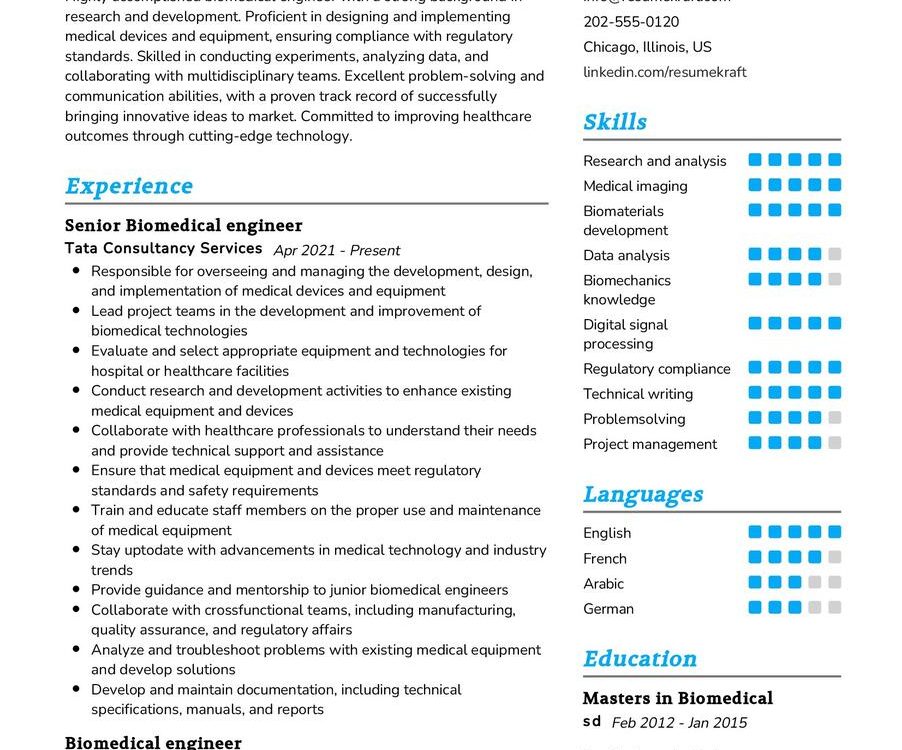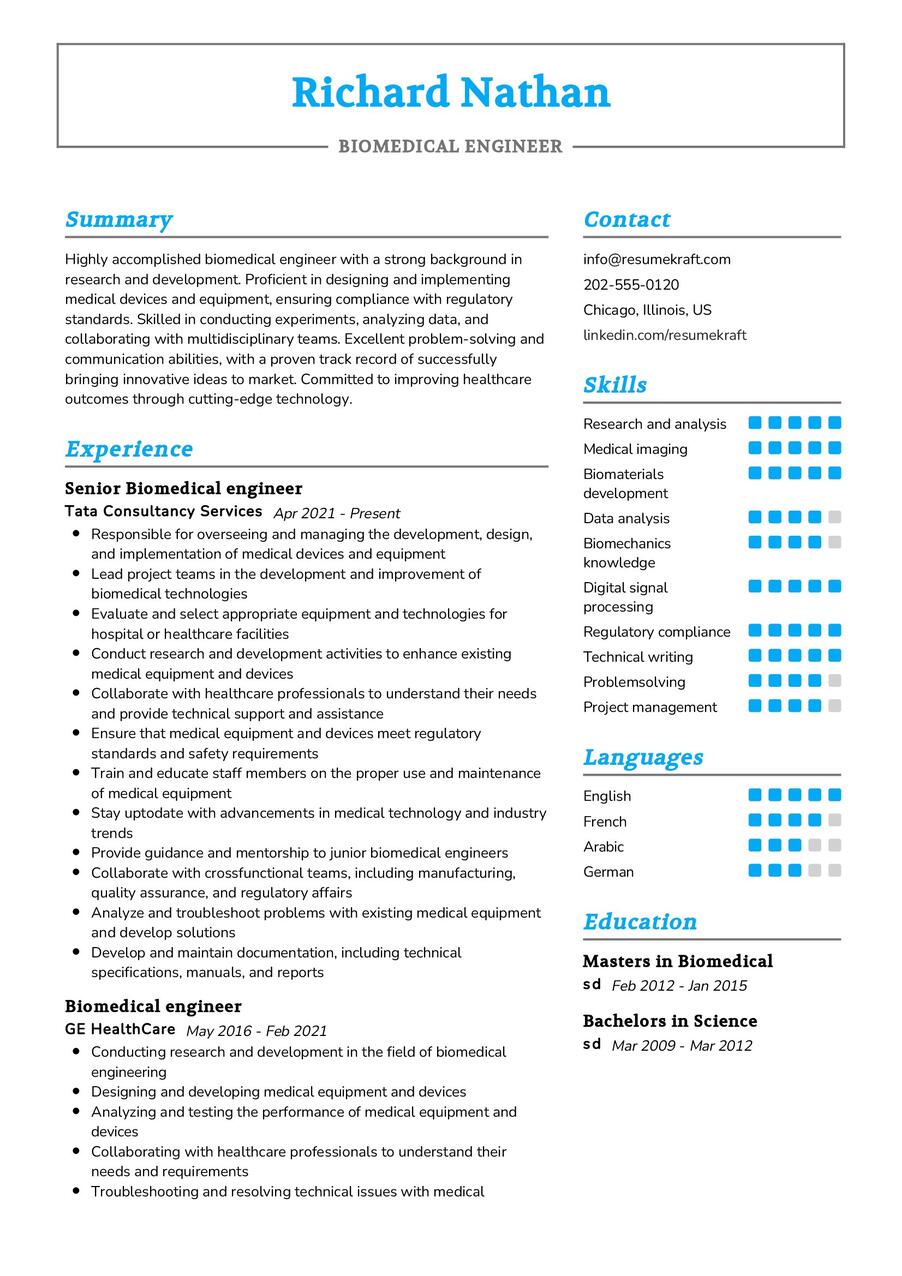Exploring the Role of a Biomedical Engineer
As the field of healthcare continues to advance, the role of a Biomedical Engineer becomes increasingly crucial. This position involves a unique blend of technical expertise and healthcare knowledge, contributing to the design and maintenance of medical equipment and systems. Let’s delve into the multifaceted role of a Biomedical Engineer, understanding the skills, qualifications, and responsibilities that define this exciting career path.
Key Responsibilities of a Biomedical Engineer
Biomedical Engineers play a pivotal role in the healthcare industry, combining engineering principles with medical knowledge to enhance patient care. Here are some key responsibilities associated with the role:
- Designing and maintaining medical equipment, such as imaging devices, artificial organs, and prostheses, ensuring their functionality and safety.
- Collaborating with healthcare professionals to understand their needs and challenges, and developing innovative solutions to address them.
- Conducting research to improve existing medical technologies or develop new ones, staying abreast of the latest advancements in the field.
- Testing and evaluating medical equipment to ensure compliance with regulatory standards and optimal performance.
- Providing technical support and training to healthcare staff on the proper use and maintenance of medical devices.
- Collaborating with other engineers and healthcare professionals to integrate technology into patient care processes.
Each responsibility showcases the vital role Biomedical Engineers play in advancing healthcare technology and improving patient outcomes.
Qualifications and Educational Requirements
To embark on a career as a Biomedical Engineer, certain qualifications and educational background are essential. Here are the key requirements:
- A Bachelor’s or Master’s degree in Biomedical Engineering or a related field, showcasing a strong foundation in both engineering and healthcare.
- Proficiency in engineering principles, including mechanics, electronics, and materials science.
- Understanding of biology and medical principles to effectively collaborate with healthcare professionals.
- Hands-on experience with relevant software and tools used in the design and testing of medical equipment.
- Strong analytical and problem-solving skills to address complex challenges in healthcare technology.
- Excellent communication skills to interact with interdisciplinary teams and convey technical information to non-technical stakeholders.
Securing additional certifications or specialized training in areas like medical device regulations can enhance your profile in the competitive job market.
Skills for Success as a Biomedical Engineer
A successful Biomedical Engineer possesses a diverse set of skills, combining technical expertise with interpersonal abilities. Let’s explore the essential skills required for success in this role:
Technical Skills:
- Proficiency in CAD software for designing and modeling medical devices.
- Knowledge of programming languages relevant to biomedical applications.
- Understanding of medical device regulations and compliance standards.
- Experience with biomedical imaging technologies and diagnostic equipment.
- Ability to analyze and interpret complex biomedical data.
Soft Skills:
- Effective communication and collaboration with healthcare professionals and engineering teams.
- Problem-solving mindset to address challenges in medical device design and implementation.
- Attention to detail to ensure the accuracy and safety of medical equipment.
- Adaptability to navigate evolving healthcare technologies and industry trends.
- Project management skills to oversee the development and implementation of medical devices.
Each skill is a valuable asset in the dynamic and interdisciplinary field of Biomedical Engineering.
Crafting a Biomedical Engineer Resume: Dos and Don’ts
Your resume is the gateway to opportunities in the field of Biomedical Engineering. Here are some tips to create a compelling resume that stands out:
- Do highlight your academic achievements, emphasizing relevant coursework and projects.
- Don’t overlook internships or hands-on experiences; showcase how they have contributed to your practical skills.
- Do tailor your resume to the specific job description, emphasizing skills and experiences that align with the employer’s needs.
- Don’t use generic language; be specific about your contributions and achievements in previous roles.
- Do include any research projects or publications related to Biomedical Engineering.
- Don’t underestimate the power of networking; mention any professional associations or conferences you have attended.
Your resume is a reflection of your skills and experiences, so make it a compelling story that captivates potential employers.
Biomedical Engineer Resume Sample
Your resume should provide a snapshot of your skills, experiences, and qualifications. Here’s an example to inspire your own Biomedical Engineer resume:
- “Biomedical Engineer with a Master’s degree in Biomedical Engineering from XYZ University, specializing in medical device design and optimization. Led a team in developing an innovative imaging device that improved diagnostic accuracy by 15%. Proficient in CAD software, programming languages, and well-versed in medical device regulations. Dedicated to advancing healthcare technology for improved patient care.”
This sample offers a glimpse into the applicant’s education, skills, and a notable achievement, providing a strong foundation for further discussion in an interview.
Key Takeaways for Your Biomedical Engineer Resume
As you craft your Biomedical Engineer resume, keep these key takeaways in mind:
- Emphasize your technical and soft skills, showcasing your ability to bridge the gap between engineering and healthcare.
- Highlight specific achievements and contributions in previous roles, demonstrating your impact on projects and teams.
- Showcase your adaptability and commitment to staying current with evolving healthcare technologies.
- Tailor your resume for each application, aligning your skills with the specific requirements of the job.
Now, armed with these insights, you are ready to create a standout Biomedical Engineer resume that opens doors to exciting career opportunities in healthcare technology.
Finally, feel free to utilize resources like AI Resume Builder, Resume Design, Resume Samples, Resume Examples, Resume Skills, Resume Help, Resume Synonyms, and Job Responsibilities to create a standout application and prepare for the Biomedical Engineer job interview.


